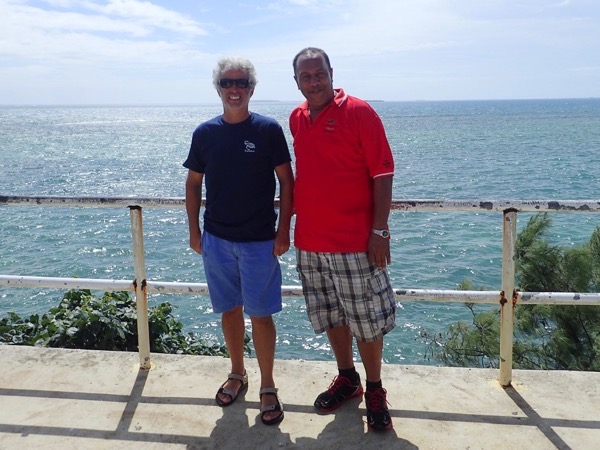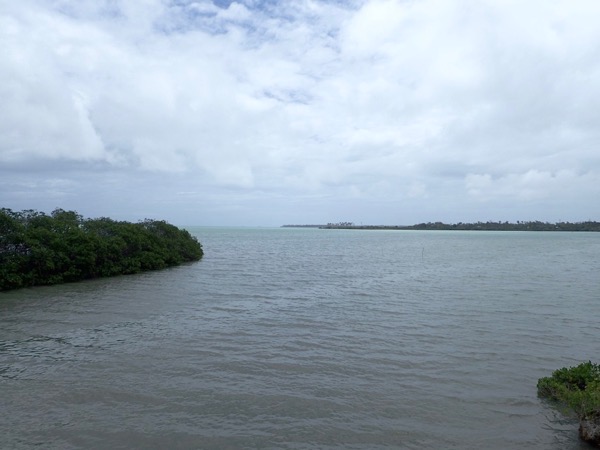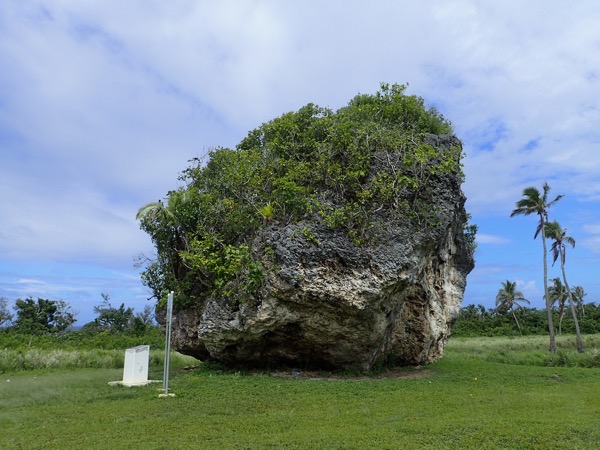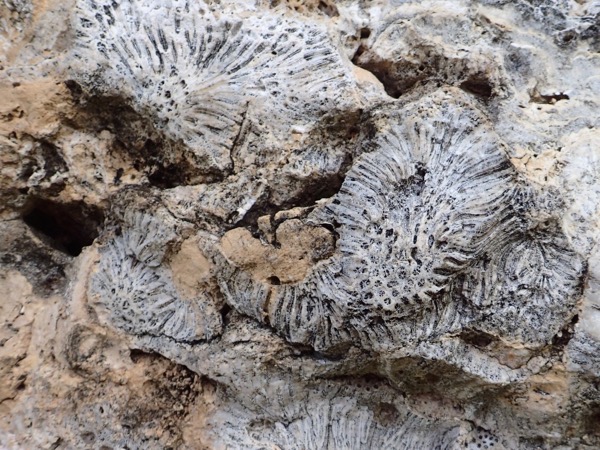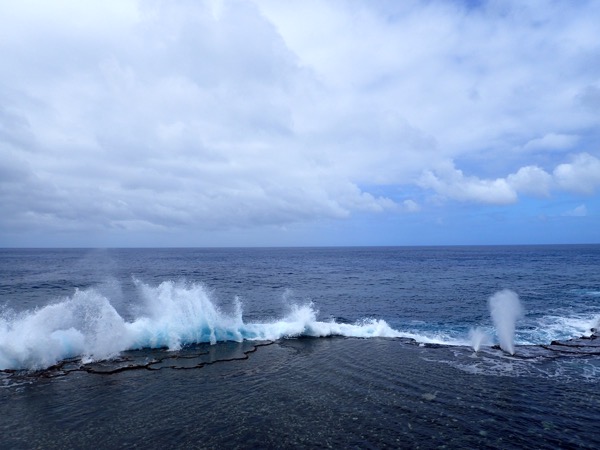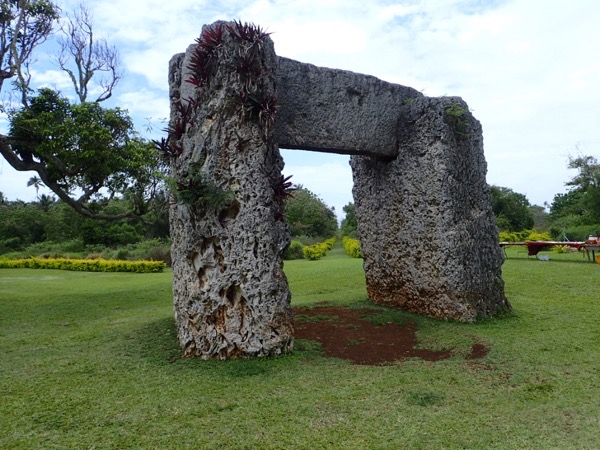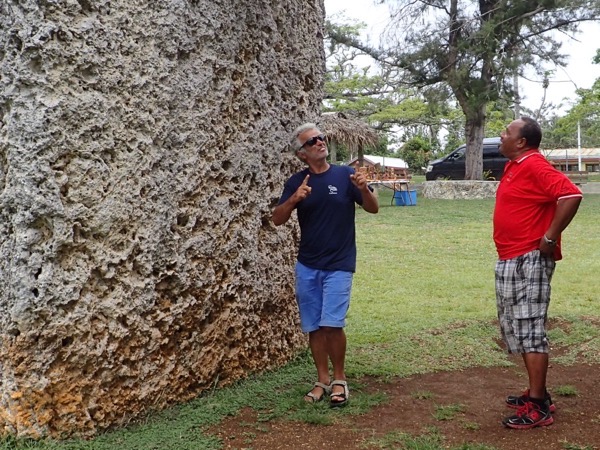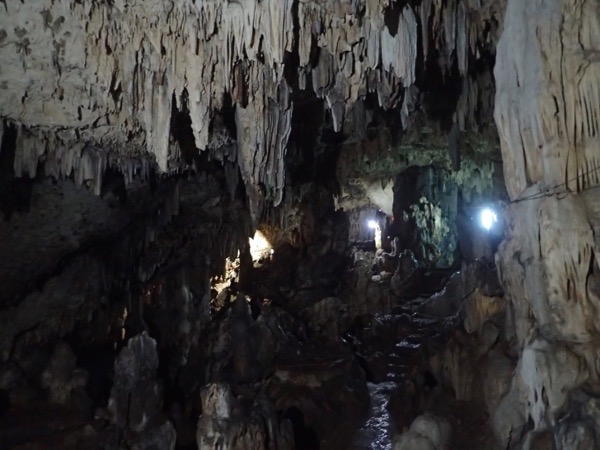Tongatapu (the last Tonga diary)

21:07.64S 175:06.9E “Captain Cook was kind to call us the ‘Friendly Isles’ but I have no idea why he did!” Inoke told us as we pulled into the petrol station. He was our guide for the day, recommended by Sherry and Rick of Sherick. I’d been wondering the same. The day before I’d caught the Big Mamma Yacht Club ferry over to town (Neiafu) to check in with Customs. Big Mamma’s husband, Richard, was also catching a ride. “You need water?” He asked, glancing at my jerrycans. “Ask the lads [who drive the ferry] to fill them for you and give them a T$5 tip.” “Hey lads, will you fill these jerrycans for a tip?” He asked the crew, in Tongan. I listened to the curt response. Clearly they weren’t going to do me the favour, not even for a tip. The small ferry docked near the fish market, I walked to the main road and turned left onto it. Approximately five hundred metres further on I came to the Port Captain’s office. I knew the Customs office was nearby but difficult to find. I stopped a young woman in a Customs uniform. “You need to go to the main Port Captain’s office.” She said, smiling. Back at the Port Captain’s office: A handsome and softly spoken officer, dressed in the traditional Pandanus mat skirt, came over. “I’m sorry, it isn’t here. You need to go to Richard’s office.” He explained. (This is a different Richard, not Big Mamma’s husband.) “Can you explain where it is? Is it down that way?” I asked, pointing towards the wharfs. So far, in the Pacific, we haven’t met a single Polynesian who can give directions. In small places, everyone knows where everything is, so there is seldom the need. “Come on, I’ll take you there.” He said, stepping through to my side of the counter. He’d obviously fallen for my ‘damsel-in-distress’ impression. The minute we walked outside into the moist heat, I could tell he was faltering. He no longer thought it was such a great idea taking the ‘palanqui’ (white person) all the way to Richard’s office. “Hey, could you take this woman to Richard’s office?” He called out in Tongan to a man wearing a yellow fluorescent ‘Customs’ waist-jacket. The man grunted something back. It sounded rude. “I see,” muttered my would-be guide. Turning to me, he said, pointing at a large green hangar: “You see that green house? It is near there.” I found Richard’s office, in a small square shed that had been added to the back of the green hangar. Richard wasn’t there and wouldn’t be back for several hours. Officer Richard, when he eventually turned up was a dour fellow, and after an argument about why it had taken us more than a day to get to Tongatapu from Ha’apai, he eventually stamped us in. I asked what time he would be working on the Monday as we would be signing out. “Normal office hours, from 8:30 to 4:30,” he replied. My impression so far was not particularly of friendliness. Inoke, our guide, spoke reasonable English. He explained that he’d been a school teacher on a good salary but had resigned to set up his own businesses. He was now a government auditor, he owned the only launderette in Tongatapu and he drove tourists around in his ‘taxi’ in his spare time. He is without doubt the most entrepreneurial Polynesian we have met and his ‘achiever’ gene has passed to his children; his eldest son is a GP in Auckland, NZ and his daughter is about to graduate as the first female Polynesian airline pilot. She has been studying in China, speaks fluent Chinese and English, and has a job lined up with Air NZ. The middle son, ‘Lazy Man’ as Inoke calls him, has taken over the management of the launderette. As we learnt more about ‘Lazy Man’, we realised he wasn’t so much lazy as perhaps a little lacking in ambition compared to his siblings. “Is education valued in Tonga?” I asked. “Education is everything.” Inoke replied. “Only the eldest son inherits the land, so the other children need education to make a living.” Education in Tonga is compulsory but it isn’t free, not even primary school. For poor families, the fees represent a high proportion of their income. To help, Inoke started a ‘cava circle’. A group of men from his neighbourhood, including his middle son, get together every Friday evening to share a meal and drink cava (alcoholic drink made from the cava root). Each member puts money into a kitty which pays for a number of scholarships for poorer families in the community. In Tonga, there is no government social security but the extended family looks after everyone and nobody goes hungry. This works at many levels. For example, last February, Tongatapu was hit by a cyclone (the harbour is still littered with shipwrecks) and Inoke’s house lost its roof. His son returned from Auckland and paid for a new roof. We were curious about the king. Like Elisabeth II, Tupou VI is a constitutional monarch. “Does the king have any power?” Inoke thought for a moment. “The king has total power,” he replied, which surprised us. The king has a veto. Government and others bring him proposals to ratify but he has the final say and often takes a stand. He is very respected and Tongans accept his edicts. This works where the king is an intelligent a sensible person. The previous monarch, Tupou’s elder brother made a few mistakes that cost Tonga dearly. Inoke took us to the other side of the island to the place where Abel Tasman landed.
Franco and Inoke at Tasman’s landing site, it wouldn’t have been our first choice All along the road, there are houses and the villages seem to merge into each other. Later we stopped off at Cook’s landfall. It was in a bay sheltered by mangrove swamps.
Cook’s landing place As we crossed the island we passed the prison. Inoke told us that crime was practically non-existent. Nearly all the people in jail had committed traffic offences but were too poor to pay the fines. We asked about gang culture as we had heard that Auckland is full of gangs representing different Polynesian nations. Apparently there isn’t a gang problem in Tonga though any Tongans deported and sent back to Tonga are interned for a period in a re-education camp. There were many churches and we asked about religion. Inoke’s family is Methodist. His father was a preacher and Inoke spent his first years in Samoa where his father was working. Methodists and Catholics are the larger groups followed by the Mormons which are increasingly appealing to young people as there is more singing and dancing. There are many other smaller denominations such as the Seventh Day Adventists. There is no conflict between the groups. Our tour took us to a large coral rock a long way inland. The Polynesian legend is that the semi-god Maui was so fed up with the rooster crowing early morning that he hurled this “stone” at it. Geologists have a different version.
This large lump of rock came from the seabed and was deposited by a tidal wave
Coral in nature On the coast, we stopped to watch a blowhole phenomenon. The swell hits a coral shelf and ‘blows’ all the way along the coast.
The swell blowing upwards from the coral shelf The highlight was Tonga’s ancient ‘dolmen’. It is the only one in Polynesia and nobody knows why it was built. The previous king had a theory that it lines up at the solstice but this doesn’t seem to have been proven categorically. Last year, Inoke was able to visit his daughter in China, his flights paid for by the Tongan government because she was doing so well. On the way back, he stopped off in London and went to visit Stonehenge. He was impressed but didn’t seem to have come to any conclusions about the Tongan structure.
The dolmen
Franco and Inoke discussing construction For lunch we stopped at a café favoured by workers. It was Saturday and most of the people coming in were ordering large takeaways then driving off with the whole family. Inoke explained that they were going to work the land. The family plots have become too small to sustain a whole family so most people have a job in town and work on the land at weekends. The food was tasty and cheap. We chose mutton wrapped in taro leaves cooked in coconut with cassava. The taro made our lips go numb, not a sensation we particularly enjoyed. After two more stops; a cave and a three headed coconut palm (very rare), Inoke dropped us off back in Neiafu. It had been great meeting him and learning a little about his culture.
The cave An ice-cream parlour lured us in. The ice-cream everywhere in Tonga is from New Zealand and very good, usually there are only two flavours to chose from but the portions are enormous. A group of dodgy looking young men wearing hoodies huddled around the next table. They were eating hollowed out loaves of bread stuffed full of ice-cream. Once they had finished, they got a cloth, wiped the table down and neatly stacked the chairs! Not quite in keeping with their bad boy looks. It was Saturday afternoon and shops were closing for the weekend. Franco, looking rather woolly, decided he wanted a haircut. Much to my surprise, barbers’ were still making a roaring trade. “How much for a haircut?” Franco asked a barber. “T$10.” A fair price, so we took our turn in the queue. The preferred style was ‘American gangster/rap star’, a number 2 with sharp edges and stripes. They all looked tough as nails but I knew the next day they and their sharp haircuts would be on their way to church in their best clothes, surrounded by their families. Franco was getting anxious, he wanted a cut a little less radical. As it turned out, his anxiety was outdone by that of one of the hairdressers who, when he realised his next client was a silver haired ‘palanqui’, ran out of the shop never to return. In the end, the boss cut Franco’s hair and it was fine, if a little short. Sunday is usually a quiet day in Tonga but not at Big Mamma’s Yacht Club. She makes the most of everything being shut in town and charges a high price for the ferry ride over to her island and lunch at the club. It was heaving. We spent the day preparing Caramor for our crossing to New Zealand. Early on Monday we raised the anchor and motored over to town where we dropped it just outside the small fishing port entrance. When we got to Richard’s office, to sign out of Tonga, the cleaner told us everyone was in a meeting and wouldn’t be back until 12 noon! Our time wasn’t wasted, we went for an ice-cream. We got back by 11am and demanded to wait in the office. In the end Richard got back early and we were signed out by midday, this time he was much more pleasant and even made a joke about his rubber stamp which had half of it missing. At 2pm we sailed. |
